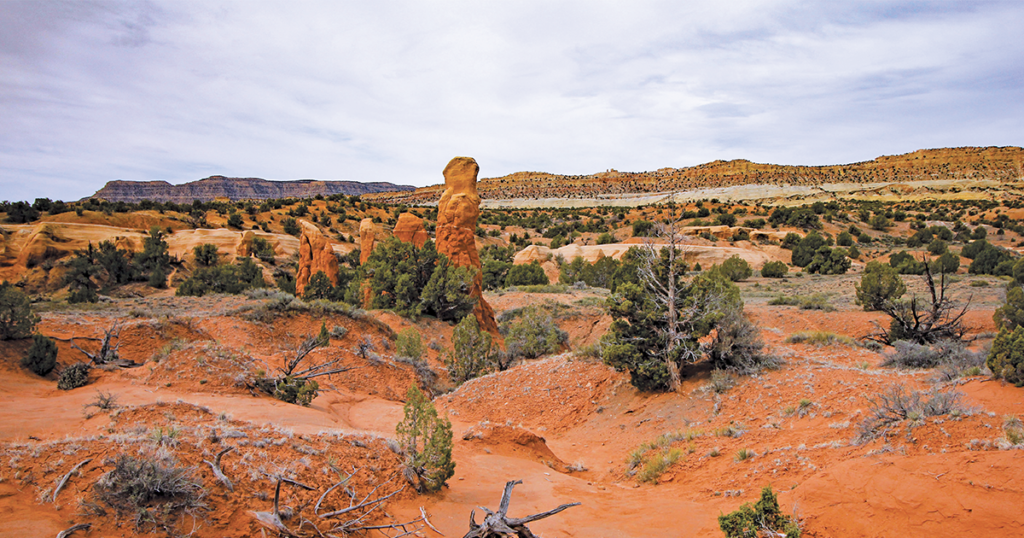Bonanza of Greed
Myths and lies will, if we let them, spell the end of the public domain

This Land: How Cowboys, Capitalism, and Corruption Are Ruining the American West by Christopher Ketcham; Viking, 422 pp., $29
The title of Christopher Ketcham’s ferocious new book—This Land—is of course an allusion to the great Woody Guthrie song, which, depending on the version you sing, is either a song about geographical patriotism or a bitter attack on private property. “This land is your land, this land is my land,” and yet nowhere in Guthrie’s lyrics do you find the words “our land.” Ketcham’s subject is our land—public land—and its despoliation. In the American West, it’s more often called federal land, a name that seems to deprive you and me—the “you and me” in Guthrie’s song—of ownership. It’s worth stating plainly that the federal lands administered by the Bureau of Land Management, the Forest Service, the Fish and Wildlife Service, and the National Park Service are public lands. They belong to you and me.
To many of the men and women in Ketcham’s book—including members of the fiercely antifederal Mormon theocratic state—that makes you and me thieves and despots. In these pages, we meet, again and again, people who believe that public land should be privatized or simply stripped of its resources. We meet resource managers—BLM and Forest Service employees—who are essentially complicit with the industries they were meant to oversee or afraid to meet the challenges posed by lunatic ranchers like Cliven Bundy and his ilk, who have staged standoffs in Nevada and Oregon and are what you might call Christian property fundamentalists. We meet legislators who are carrying the Bundy legacy forward in statehouses and in Congress, creating coalitions like the one that gave Donald Trump the chance to destroy Bears Ears and the Grand Staircase-Escalante National Monument. As Ketcham notes, there has been a flood of anti–public lands legislation in Congress, nearly all of it sponsored by western senators and much of it funded by the Koch brothers. The goal, he writes, is to create a precedent for the “evisceration of public lands.” In a sense, This Land revives and updates the activism of historian Bernard DeVoto, whose essays in the 1940s did more to heighten awareness of the threat to public lands than even Woody Guthrie. “Your property is in danger of being alienated,” DeVoto wrote in Harper’s, “your interests and those of your children are threatened.” The call was picked up by Aldo Leopold. “Disrupt the public domain,” Leopold wrote, “and the national forests will follow; disrupt the national forests and the national parks will follow.” Here we are nearly 75 years later, and the bitter end of the public domain is practically in sight. Cattle graze on some 255 million acres of public land, at absurdly low lease fees, destroying natural habitat wherever they go. Wildlife Services—the wildlife extermination branch of the Department of Agriculture—operates practically without oversight in “protecting” livestock from predators. The Forest Service has built nearly a quarter of a million miles of road since 1964. It proposes “thinning”—a synonym for logging—forests as a way of preventing forest fires, contradicting what science says on the subject.
“The Forest Service, I had thought, was one of the good guys,” writes Ketcham, a freelance journalist for Harper’s and other magazines. What makes This Land so pressing and so painful is that it drains any reservoirs of political naïveté you may have left. It reminds us that myths—including the rancher myth of self-reliance—are the collective lies we tell ourselves to keep from seeing what is actually happening. Think Trump is the problem? Ketcham shows us the crowd of legislators who gathered as the president amputated Bears Ears and Grand Staircase-Escalante. He reminds us that, when it comes to public-lands management and the enforcement of laws like the Endangered Species Act, the downward trajectory has barely changed under the past three presidents. He makes it clear that when it comes to conservation, the Democrats offer no meaningful resistance, no guidance whatsoever. And that some of the largest environmental groups on the planet—including The Nature Conservancy and The Wilderness Society—have been corrupted by what is sometimes called third-generation environmentalism, which is rooted in collaboration and compromise. To that end, Ketcham quotes the great Bob Marshall, the activist who founded The Wilderness Society in 1935: “We do not want those whose first impulse is to compromise.”
Near the end of this stunning book, Ketcham puts together a politically impossible wish list—the things we must do to begin restoring public lands in the West. It goes like this: End grazing on public lands. Begin removing roads on public lands. Shut down Wildlife Services. Stop leasing oil and gas wells. Stop logging. Accept, as he says, “that economic growth will not ever be green or sustainable.” This may sound like extremism, but as he says, “the real extremists among us destroy life for profit.”
It’s worth noting that all of these things will be part of what’s required to begin dealing with climate change—and with the political stranglehold of industries that have refused to acknowledge climate change. When it comes to the conservation of habitats and species, there is no time left for compromise, no time left to make sure that all the humans involved—the so-called stakeholders, the stockmen and loggers and oilmen—get to walk away happy. Walking away happy is no longer an option. There are no convenient tradeoffs left. Everything in nature that can be conserved must be conserved against the threat of human need and desire and negligence. How we got to this terrible place is a story we’re all still learning to tell—or still denying. This Land is a book that will help us tell the story truthfully, a book for the hard times now that are a prelude to harder times ahead.

